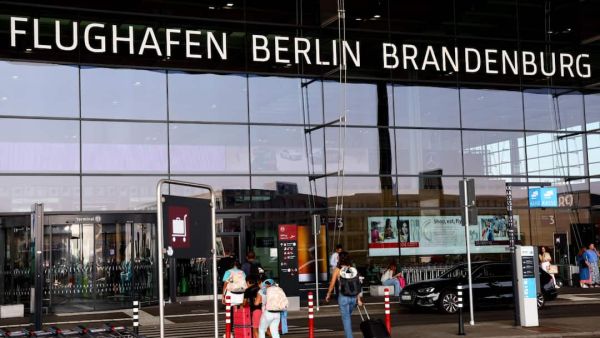
Flight operations at Berlin Brandenburg Airport were suspended for almost two hours on Friday night after several drone sightings disrupted air traffic, marking another unsettling incident in a growing series of mysterious aerial intrusions across Europe.
The suspension, which began around 8:08 pm (1908 GMT), forced multiple flights to divert to other German cities before operations gradually resumed at 9:58 pm. The airport, Germany’s third-largest, temporarily lifted its night-flight ban to clear the backlog and allow stranded travellers to depart once normal services resumed.
A spokesperson for the airport told AFP that “a whole series of flights” had been rerouted during the closure, while frustrated passengers took to social media to complain about delays and confusion. “We assume that the danger has been averted for the time being,” the spokesperson said, according to DW News.
Multiple Drone Sightings Cause Disruption
The alert was triggered when an airport official spotted a drone hovering above the northern runway. Shortly afterwards, another was seen by security personnel in a patrol car, prompting authorities to declare an emergency and suspend all take-offs and landings. A police helicopter was deployed to trace the unmanned aerial vehicles (UAVs), though their origin remains unknown.
The disruption affected both domestic and international flights. Services bound for Basel, Oslo and Barcelona were grounded, while a London–Berlin flight was diverted to Hamburg after the pilot reported drone activity near the airport. Arrivals from Stockholm, Antalya and Helsinki were also redirected, reports said.
Drone Threat Expands Across Europe
This incident follows a similar scare in Munich last month, when drones forced authorities to close the airport twice within 24 hours. Nearly 20 flights were grounded, affecting about 3,000 passengers, and several incoming services had to be diverted to other German cities and Vienna in Austria.
Over the past two months, airports in Denmark, Norway and Poland have also been forced to suspend operations after unidentified drones were detected in their airspace. Some European countries, including Romania and Estonia, have suggested that Russia may be behind such incursions, though Moscow has denied the accusations.
Germany, a major NATO supporter of Ukraine, has also raised concerns about possible hybrid threats targeting its critical infrastructure. In recent months, drones have been reported over military bases, industrial zones and other sensitive sites within the country.
Germany Moves to Strengthen Drone Defences
Interior Minister Alexander Dobrindt has called for “new responses to this hybrid threat”, urging the development of stronger systems to detect, assess and, if necessary, disable unauthorised drones.
Under German law, flying drones within 1.5 kilometres of an airport is strictly prohibited. However, as incidents like the one in Berlin reveal, enforcing these regulations is becoming increasingly difficult as drones grow smaller, cheaper and more sophisticated.
-
Trump Claims Christianity ‘Under Threat’ in Nigeria, Orders Special Monitoring

-
Raising Awareness for Preterm Births and Supporting Infant Health

-
Judge blocks Trump from requiring citizenship proof on federal voting forms

-
Why Fiber Is the Secret Weapon for Balanced Blood Sugar

-
Is there heavy bleeding during periods? This beautiful flower is a panacea, it will also give relief from pain and cramps. – ..
